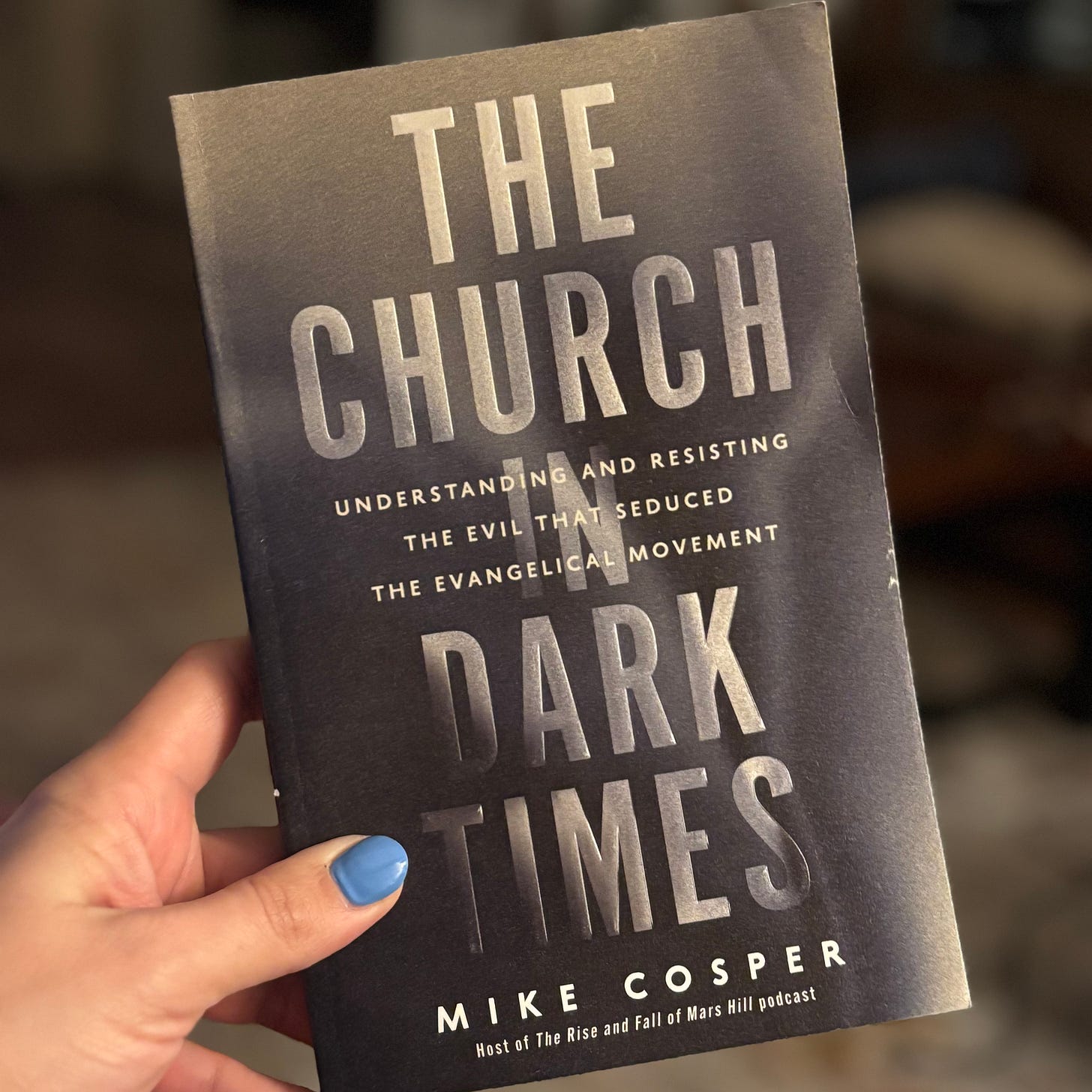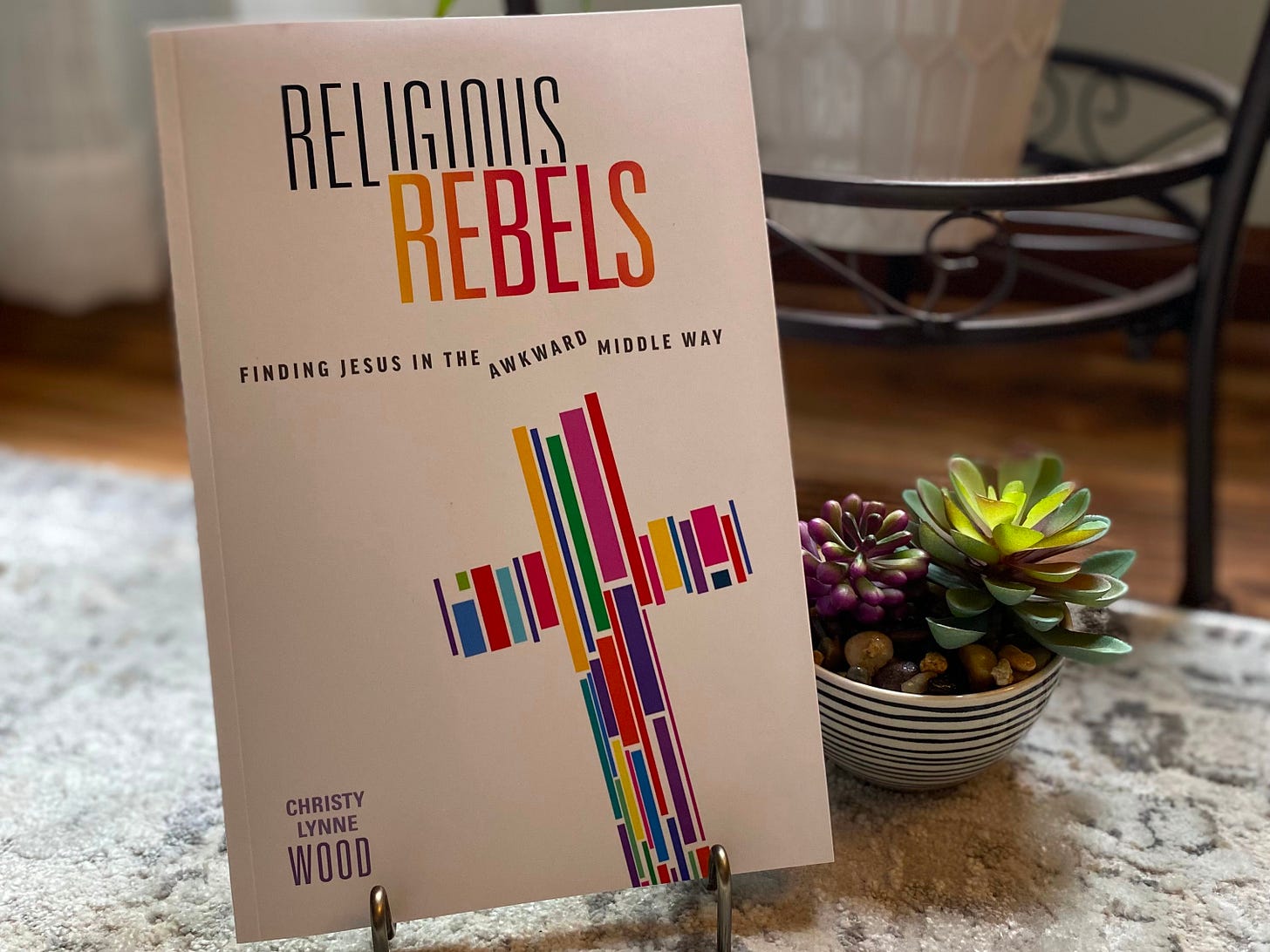Fear, Formulas, and Fundamentalism
The necessity of embracing mystery and cultivating a regulated life
Two weekends ago I went away to a tiny cabin in the woods, embraced winter, and grieved my lost adolescence. Reading through my journals, I looked at my ten years in a Christian cult with older eyes and let myself feel how messed-up some of those seemingly good things were. I cried a lot, and I got angry. I spoke truth to the girl who was always too strong, too opinionated, and too critical, and I told her that she wasn’t wrong. It was a healing three days, and I came back ready to tell my story without apology.
My family joined Bill Gothard’s homeschool group (cult) known as the Advanced Training Institute when I was twelve years old. Gothard created his Institute in Basic Life Principles (originally named the Institute in Basic Youth Conflicts) in the 1960s, and by the mid 1970s people filled arenas across the country to attend his Basic Seminar. Although he was considered ultra-conservative and even unbiblical by some evangelicals, an estimated 2.5 million people have attended the Basic. If you aren’t familiar with Gothard or his organization, Amazon’s Shiny Happy People does a great job at giving a peek.
Gothard made political and religious connections across the world and set up training centers in the USA, New Zeeland, Taiwan, Romania, and Russia. The organization operated like a sinister whirlpool. Some people only attended the Basic Seminar at the edge of the pool and went away tainted but mostly unaware of what they had just experienced. However, as people became more involved in Gothard’s other seminars, courses, and his homeschool curriculum, the formulas, twisted truth, outright lies, and tight control sucked them into a strangle hold.
How could so many people—including my parents—have been deceived? Perhaps it was because they were afraid. Fear is an extremely effective motivator. If you can capitalize on people’s fear, you can control them. Power hungry people like Gothard know this.
The cultural turmoil and subsequent changes of the 60s and 70s were frightening to many people. Gothard showed up and offered them seven basic principles and three-step formulas for blessings and success. In the 80s and 90s evangelicals believed they were fighting a culture war for the souls of their children. Gothard provided a homeschooling program that was guaranteed to keep their children from rebelling. (Hint: it didn’t work.)
When people are afraid, they are vulnerable.

Everyone seems to be afraid these days. Social media and the twenty-four hour news cycle work together to keep us in a constant state of fear, and we never stop to ask why. Sure, different people are afraid of different things, but there is fear on every side. When our bodies are dysregulated by fear or anxiety, we operate from our brainstems. We are literally incapable of higher order or critical thinking. Instead our bodies and brains are focused solely on survival. I think this is what makes us susceptible to formulas and ideologies—we crave safety.
According to Maslow’s Hierarchy of Needs, after the basic physiological needs of air, food, water, shelter, clothing, and sleep, people need to feel safe and secure. We desperately need safety and security in order to be fully functioning human beings. I hate that power hungry people exploit these genuine, basic needs, but they do. I’m not just talking politics or religion right now. Corporations with their marketing and advertising departments and social media and news companies also use our fear for their own advantage. Fearful people are easy to control.
Mike Cosper talks about comprehensibility and ideology in his new book, The Church in Dark Times. Comprehensibility is the certainty that humans are capable of comprehending anything and everything. With our technological and scientific progress over the last one hundred fifty years, I can see why comprehensibility could be believable. However, there are actually many things that people can’t explain and don’t understand; we just tend to ignore them as we create or embrace our ideologies.
An ideology is a story we tell so that our world makes sense. It pretends to have a hidden understanding of past and future events and claims secret knowledge and explanations. Although an ideology often uses logic and numbers, it also conveniently ignores conflicting data and opposing facts that don’t align with the story. An ideology is grandiose and consuming, but it makes us feel safe and secure so we buy in. If you are wondering if your beliefs are actually an ideology, take the time to critically ponder whether your explanations for life are overly simple and comprehensible. Many of us are operating within an ideology without even knowing it.
Fear filled people also cling to formulaic thinking to feel safe. Faith formulas were prevalent in Gothard-land growing up; I think just about everything was a formula. If we did a and b, then God would do c. I see this kind of thinking popping up all across the spectrum of Christianity. We desperately want control in a world that feels increasingly chaotic. If we do this, then…

The problem is, it doesn’t work. God isn’t a vending machine that can be controlled by the right coins and a push of a button. Our world is broken, and no formula, political power, or amount of faith is going to fix it. There isn’t a neat ideology that can explain the complexity of humanity. Our world isn’t actually comprehensible. It’s complicated and nuanced. It’s filled with paradox and mystery. But in order to accept nuance, paradox, and mystery, we first need to reject our own fundamentalism.
As a former ultra-fundamental Christian, I have plenty of experience with black and white thinking, us versus them rhetoric, and strict adherence to a specific set of values. I know what it’s like to be afraid of people who aren’t just like me. I understand how to create strawmen out of an opponent’s opinions that are easy to destroy while never actually talking to someone who supposedly holds those beliefs.
But fundamentalism isn’t just a problem with conservatives these days. In our polarized society, I’ve met plenty of liberals and progressives who may have deconstructed their evangelical faith, but never got to the inner layer of their fundamentalist heart.
The same black and white perspectives, us versus them rhetoric, and strict adherence to an ideology, along with the ability to create and destroy strawmen is everywhere these days. We are all afraid of things that are happening in our world, and we are all afraid of each other.
I hear what sounds like hatred on every side. People say, “How could they believe those things?” and “I could never be around someone who believes like that.” We are content to isolate ourselves with people who are like us and refuse to know people who are different. And the only ones who benefit from our nearly constant fear and dysregulation are the people who are in power. If we are going to actually make a difference in our crazy world, we must learn to regulate ourselves and embrace nuance.
I’ve changed many of my beliefs in the past few years—most of the time because I met and talked with someone who thought differently. Sometimes my beliefs changed because I read a book that opened my eyes to a new perspective. I’ve learned from people I don’t always agree with and I’ve grown. Other times discussions only make my opinions more solid even if others disagree. There are sets of beliefs I hold tightly, others that I hold loosely, and still other areas or questions where I honestly say I don’t know.
I’ve learned to live in a place without absolute certainty in every area and still feel secure. I’m comfortable with questions, mystery, and doubt. I don’t need an ideology anchored in a false notion of comprehensibility. I’m okay with not having answers to everything. I’m learning to regulate myself by ignoring the deafening din of social media and the news and instead focusing on my one, beautiful, real life in front of me.
It’s pretty messy out there right now. There are a lot of people vying for power and attention. They want us to be afraid and dysregulated—living in our brainstems and just trying to survive. These people don’t want us to think critically or rationally so that we reject ideology, formulas, and fundamentalism. They don’t want us to embrace nuance and mystery. There’s no money and power in that.
But I refuse to live afraid any more. I refuse to be controlled—been there, done that. I refuse to hate others. This world might be broken, but I’m going to get to know people I disagree with, show grace, and be willing to learn. My firmly held theology tells me that every person has been made in the image of God and is capable of having a relationship with him through Jesus. God loves the people in this world and I want to love them too even if we have nothing in common. I want to be kind, gentle, patient, and self-controlled as I am filled with the Holy Spirit. I’ll speak truth, don’t worry, but I pray that it is truth soaked in love from a heart of humility.
As always, I'd love to hear your thoughts, questions, or comments. You can find me on Threads, Instagram, Facebook, in the Substack app, and on my website. I’d love to connect with you on any of these places!
My podcasts, Religious Rebels and Looking for the Real God can be found here on Substack, and on YouTube, Apple Podcasts, Spotify, iHeart Radio, and anywhere you listen to podcasts.
You can order an autographed copy of my book, Religious Rebels: Finding Jesus in the Awkward Middle Way by clicking on the button below. Or you can find it on Amazon.








When we’re afraid we’re vulnerable- that’s so true! I also agree with you that the problem of fundamentalism is deeper than we think, and we see this in some people who become liberal or progressive but have the same fundamentalist mindset that they carried over from their conservative fundamentalist upbringing. The same rigid thinking, the same proof texting, fear of loss, and scarcity-based solutions.
“Fear filled people also cling to formulaic thinking to feel safe.” 🔥
To me the irony is that the fear filled thinking created an environment for children where instead of feeling safe some of us felt constant anxiety and stress because in the extremism we were just one bad decision away from falling off the cliff.
This was really beautifully written and I’ve enjoyed your work.